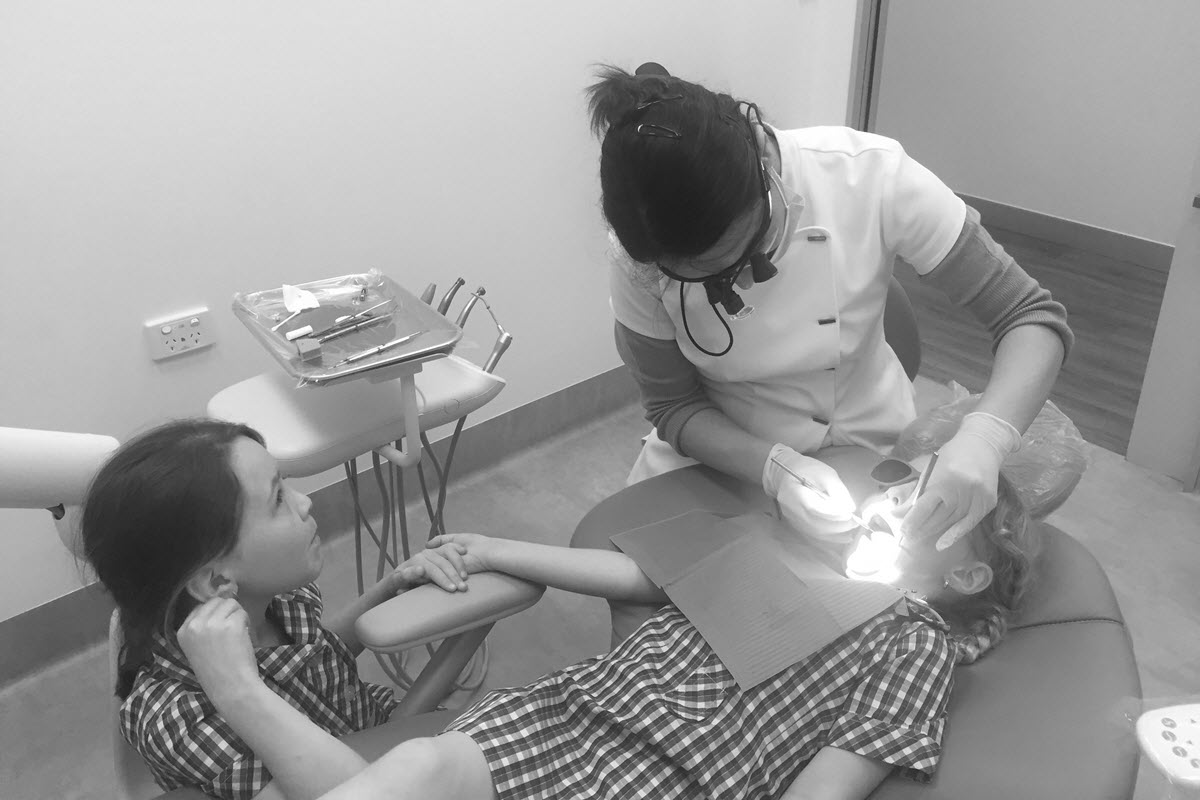What kind of support do special needs children require for dental care?
According to Dr Ellie Nadian Kids Dental Specialist, Supporting special needs children in dental care requires a holistic approach that goes beyond just the technical aspects of dental treatment. It’s about creating a safe, welcoming environment where the child feels comfortable and cared for, ensuring that their dental health doesn’t get neglected due to fear or inability to cope with traditional dental care settings.
When it comes to the type of support special needs children require for dental care, here’s a straightforward rundown:
- Personalised Care Plans: Each child’s needs are unique. A dental care plan must be customised to fit not only their dental needs but also their ability to tolerate certain procedures. This might mean shorter but more frequent visits or the use of visual aids for children with communication difficulties.
- Pre-Visit Preparation: For some children, knowing what to expect can significantly reduce dental anxiety. This could involve social stories about dental visits, pictures of the dental office and staff, or even pre-visit tours when possible.
- Specialised Techniques: This is where my specialty, sleep dentistry, comes into play. For kids who find dental visits extremely stressful or for those who cannot stay still during a procedure due to their condition, sleep dentistry using general anaesthesia can be a game-changer. It allows for a safe, anxiety-free dental experience where all necessary dental work can be done in one go, without distress for the child.
- Sensory Adaptations: Many children with special needs might be hypersensitive to lights, sounds, or touch. Dental offices that cater to these children (see kids dentist) often modify their environments to be less overwhelming, such as by using softer lighting, noise-cancelling headphones, or sensory toys.
- Training and Compassion: Perhaps most importantly, the dental care team needs to be trained in handling the unique challenges that come with special needs dentistry. This includes being patient, understanding, and skilled at communicating with children who have varying levels of comprehension and expressive abilities.
- Family Support and Involvement: Parents and caregivers are integral to the dental care process. Their involvement can help in easing the child into the dental care routine, and their input is vital in creating an effective care plan. Plus, educating families on at-home dental care practices ensures continuous dental health care.

How are dental problems in special needs children addressed or prevented?
According to Brisbane Paediatric Dentists, the key to managing dental health in children with special needs lies in personalised preventive care, early intervention, and the use of specialised techniques such as sleep dentistry when necessary. This approach helps ensure that these children can maintain good oral health, contributing to their overall well-being.
Understanding the Unique Challenges of Children with Special Needs
According to Brisbane Dental Sleep Clinic, children with special needs may face greater challenges in maintaining oral health due to various reasons, including physical, developmental, behavioural, or emotional conditions. These challenges can make routine dental care difficult, such as brushing, flossing, and regular dental visits.
Preventive Measures
Prevention is key in managing dental health for children with special needs. This includes:
- Regular Oral Hygiene: Tailored advice is given to parents or caregivers on how to maintain the child’s oral hygiene effectively, considering the child’s specific needs and abilities.
- Dietary Guidance: Parents receive guidance on healthy diets that reduce the risk of dental problems, emphasising the importance of limiting sugary foods and drinks.
- Early Dental Visits: Early and regular dental checkups by dentists familiar with special needs children are encouraged. These visits help in the early detection and management of potential dental issues.
Addressing Dental Problems of Special Needs Children with Sleep Dentistry
For children who cannot conventionally tolerate dental treatment due to their special needs, sleep dentistry for children using general anaesthesia offers a safe and effective solution. This approach allows the paediatric dentists to perform necessary dental procedures while the child is asleep, ensuring:
- Safety: A medical team carefully monitors the child throughout the procedure.
- Comfort: The child experiences no discomfort during the dental treatment.
- Efficiency: Multiple dental issues can be addressed in one session, reducing the need for repeated visits.
Collaborative Care Approach
Addressing and preventing dental problems in children with special needs involves a team approach, including paediatric dentists, parents, caregivers, and other healthcare professionals. This collaborative effort ensures that dental care is tailored to meet the unique needs of each child, focusing on both preventive measures and effective treatment strategies.

What specific challenges do special needs children face regarding dental health?
Children with special needs face several specific challenges when it comes to maintaining their dental health:
- Communication Barriers: Many children with special needs may have difficulty communicating discomfort or pain related to dental issues. This can lead to late diagnosis and treatment of dental problems.
- Behavioural Challenges: For children with conditions such as autism spectrum disorder (ASD) or attention deficit hyperactivity disorder (ADHD), sitting still for a dental exam or treatment can be extremely challenging. This makes regular dental care difficult.
- Physical Limitations: Certain physical disabilities may make it hard to practice regular oral hygiene effectively. For example, children with motor disorders might struggle to brush or floss properly.
- Medication Side Effects: Some medications prescribed for various disabilities can have side effects that negatively affect dental health, such as dry mouth, which increases the risk of tooth decay.
- Dietary Preferences: Children with special needs might have restricted dietary preferences high in sugars or carbohydrates, which can contribute to tooth decay.
- Increased Risk of Oral Diseases: Due to the above challenges, children with special needs are at a higher risk of developing dental problems, including gum disease and cavities.
Sleep dentistry for children using general anaesthesia offers a solution to many of these challenges by allowing dental procedures to be completed. In contrast, the child is asleep, ensuring their comfort and safety and making comprehensive dental care accessible. It’s important for dental professionals to work closely with parents and caregivers to tailor dental care plans that address these unique challenges, ensuring these children maintain optimal oral health.

How does a paediatric dentist cater to the unique needs of special needs children?
In special needs dentistry for children, focusing on sleep dentistry with general anaesthesia, we tailor dental care to suit the distinct requirements of kids who might find the typical dental environment challenging. For children with special needs, which can range from physical, developmental, and emotional to sensory impairments, a standard dental appointment can be overwhelming or simply unfeasible due to the difficulty in staying still or understanding instructions.
Sleep dentistry using general anaesthesia offers a compassionate solution. Here’s how it caters specifically to these children:
- Safe and Stress-Free Environment: General anaesthesia allows these children to sleep through the procedure. This means there’s no fear or dental anxiety associated with dental tools or the noises of a dental clinic, creating a stress-free experience both for the child and the parents.
- Comprehensive Care in One Visit: Since the child is asleep, paediatric dentists can perform multiple procedures in one go, reducing the need for repeat visits. This is especially beneficial for children who find it challenging to adjust to new environments or who may have a hard time with follow-up appointments, Dr Roya, an experiment dentist in Perth, says.
- Specialised Team and Equipment: Clinics offering this service are equipped with specialised teams that understand the nuances of working with children with special needs. From the dental surgeons to the anaesthesiologists, every team member is trained to provide compassionate care tailored to the child’s unique needs. The equipment and facilities are also designed to accommodate various special needs, ensuring a safe and comfortable environment.
- Pre and Post-Care Support: There’s a strong emphasis on supporting the family before, during, and after the procedure. This includes detailed discussions with the parents about what to expect, how to prepare their child, and post-care support to manage recovery at home. It ensures that the entire experience is as smooth and worry-free as possible.
- Customised Treatment Plans: Each child’s needs are unique. Therefore, treatment plans are highly personalised. Before undergoing general anaesthesia, a thorough assessment is conducted to understand the child’s medical history, specific needs, and the best approach to treatment. This ensures that the dental care provided is not only effective but also aligned with the child’s overall well-being.
By focusing on sleep dentistry using general anaesthesia, dental practices can offer a compassionate, safe, and efficient way to address the dental needs of children with special needs, making dental health a reachable goal for every child, regardless of their challenges. This approach reflects a deep understanding of the unique hurdles these children face and a commitment to providing care that respects their needs and dignity.
What role do parents and caregivers play in the dental health of special needs children?
Parents and caregivers act as the primary facilitators of dental health in several ways:
- Routine Oral Hygiene: They help establish and maintain a consistent oral hygiene routine. This includes brushing teeth, using fluoride toothpaste, and flossing. For children with special needs, adaptations may be required, such as using toothbrushes with larger handles or electric toothbrushes to make the process easier and more effective.
- Dietary Choices: They control dietary choices, limiting sugary foods and drinks that are detrimental to dental health. A diet rich in fruits, vegetables, and water can significantly reduce the risk of dental issues.
- Regular Dental Visits: Ensuring regular dental check-ups is crucial. For children with special needs, parents and caregivers can seek out dentists specialising in special needs dentistry, who are better equipped to handle their specific requirements, including the provision of sleep dentistry under general anaesthesia when necessary. This ensures a thorough examination and treatment in a manner that’s comfortable for the child.
- Education and Advocacy: Parents and caregivers educate their children on the importance of dental health to the best of their ability and advocate for their needs in dental settings. This might involve explaining to dental professionals the specific needs and behaviours of their children to ensure a positive dental experience.
- Preventative Measures: They can implement preventative measures like using dental sealants and fluoride treatments as recommended by paediatric dentists. These measures are particularly beneficial for children with special needs, who might be more prone to dental problems.
Parents and caregivers are indispensable in the dental health journey of children with special needs. Their active involvement, adaptation to specific needs, and collaboration with kids’ dental specialists ensure the children receive the best possible care, thereby significantly contributing to their overall health and well-being.
